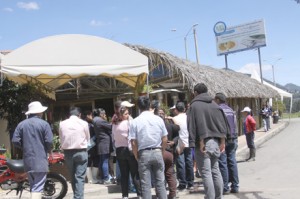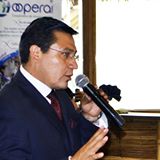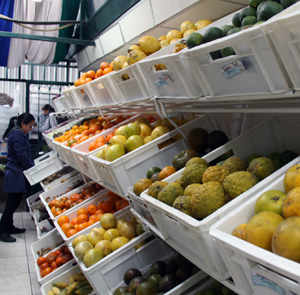Coopera shutdown: thousands of investors, including hundreds of expats, are stunned by June arrests
Editor’ note: This the first of a two-part series about the collapse of Cuenca financial cooperative Coopera, and its aftermath.
By David Morrill

Coopera account holders in Guayaquil at a government meeting regarding the recovery of coop assets.
In June, when the Cuenca-based cooperative Coopera was shut by federal officials, it was one of Ecuador’s largest financial institution failures since the country’s banking melt-down of 1999 and 2000. The closure affected more than 116,000 investors, including about 400 North American expats.
For those who followed events in the local and national media, the reason for the closure seemed clear.
The Coopera general manager, chief financial officer, and auditor were arrested on charges of money laundering, with embezzlement charges added three months later. Federal and local law enforcement said that the three had been involved, with other Coopera investors, in sending money through Venezuelan banks in a multi-million-dollar laundering scheme. In August and September, six more Coopera employees and Board of Director members were arrested for a variety of financial crimes.
Behind the headlines, however, details of events that preceded and followed the Coopera closure are much murkier. It appears, in fact, that the government agency handling the case, the Superintendencia de Economía Popular y Solidaria, SEPS for short, may have violated a number of banking and internal agency rules during the process, and possibly some constitutional rights as well. In any case, it provided precious little information to back up its actions, claiming, among other things, that documentation about the closure must be kept secret to protect whistleblowers who came forward to report suspected criminal activity.
Strong evidence also suggests that financial problems existed at Coopera years prior to the closure, leading investors to wonder why government regulators didn’t act sooner.
Other questions have been raised about the relationship between Coopera general manager Rodrigo Aucay and Ecuador President Rafael Correa. Aucay, a member of Correa’s PAIS political party, was defeated in his campaign last year for a seat in Ecuador’s National Assembly. Azuay province prefect Paúl Carrasco says that Coopera funds may have been illegally used for Aucay’s campaign and says that “clarification” is needed about the Aucay – Correa connection. Some Coopera members suggest that coop funds were funneled illegally to several PAIS assembly members and this is a factor in the government’s handling of the case.
SEPS’s formula for paying back account holders is another point of contention. The formula, changed at the last minute according to Coopera investors, favored small accounts at the expense of larger ones instead of the more typical proportional formula under which all account holders receive some of their money. Although SEPS has repaid more than 99% of Coopera’s 116,000 account holders, including about 180 North Americans, attorneys representing unpaid members point out that the 1% of unpaid accounts represents 60% to 70% of all money deposited in the cooperative.
On the personal level, the Coopera shutdown has created hardships for many of the 670 unpaid depositors, including as many as 400 North American expats. Many retiree investors depended on revenue from their accounts to cover living expenses.
The plot thickened in September, when Correa finally became involved in the case. Coopera members had tried and failed on several occasions to meet with him earlier.
First, in comments on his Twitter account, then during a September 26 visit to Cuenca, Correa said unpaid Coopera members should not expect a full refund, noting that the government is constitutionally prohibited from using federal money to reimburse depositors of private banking institutions. He followed up with more comments during his weekly television broadcast on Saturday, September 28, saying some support, including student scholarships and low-interest loans, might be offered to Coopera investors who lose money.
Sharing Hardships and Hope
“This is a personal tragedy for a lot of people,” says Cuenca expat Patricia LaPlaca, a Coopera member who has played a prominent role in efforts to provide information to fellow expats. “People worked hard for the money they invested in Coopera and now all they can do is wait and wonder what happened.” She tells stories of Cuencanos and expats who have been forced to scale back their lifestyles, in some cases having to move in with family and friends.
Despite her efforts on behalf of expats, LaPlaca emphasizes the fact that all unpaid Coopera investors, Cuencanos and expats alike, suffer together. “Some things have been said that have tended to divide Cuencanos and expats. Emphasizing the hardships of the gringos is unfortunate. We are not a special group and we don’t deserve special treatment. We are all in this together and it is important that we stay united if we hope to get our money back.”
Cuenca attorney and Coopera member Carlos Heredia believes that some of the pain could have been avoided had the government operated openly. He is convinced that SEPS violated Ecuador’s constitution during the closure process and its aftermath. “I believe there are two clear violations of constitutional rights in the case,” he says. “One is a violation of the right of transparency, the public’s right to information, and the other is a violation of basic human rights.”
Heredia has gone to court three times, once to stop the Coopera dissolution process and twice asking for information about the closure, and has lost on all three occasions. Like LaPlaca, he stresses the importance of maintaining a united front and pressing the case. “If we have any hope of getting justice in this case, we have to be persistent and we have to stay together.”
Coopera’s Unique Business Model
Founded in 2003, Coopera, or Cooperativo de Ahorra y Crédito, as it is formally called, was not an ordinary Ecuadorian financial cooperative. While most coops limit their activities to providing financial services, Coopera adopted an ambitious plan of supporting area farmers and establishing a network of organic-food markets and restaurants for retailing the farmers’ products. It also offered loans to small farmers who otherwise had no access to the credit markets and became actively involved in a variety of community projects. Although it began in Cuenca and Azuay Province, Coopera expanded over the years into Guayas and El Oro provinces.
Coopera’s business model proved to be a major attraction for investors, including many expats. “My husband and I were really impressed with Coopera’s sense of community responsibility and what they did for small farmers,” says LaPlaca. “The more we learned about it, the more we liked it and we decided to invest our money with them.”
Coopera was also known for paying the highest rates of interest on deposits in the area. At one point, the going rate for large accounts was 12.75% annually, almost double the highest rate paid by local banks, and 1.5% above that paid by other cooperatives. According the members, Coopera could afford to pay high rates because of the high rates charged on loans to farmers, small businesses, and other borrowers.
One Cuenca expat who asked not to be named, invested in Coopera for both its community involvement and for the high interest rates. “Their initial rate of 11.25% was way better than the 6% being paid by banks,” she says. “I also liked the fact that my money was serving the community, helping everyone, as opposed to the bank, where the profits stay in the hands of the owners.”
Cuenca native and Coopera member Elisa Vallejo agrees. “Besides paying a good rate of interest, Coopera offered a social model to improve peoples’ lives. It helped people in the countryside to grow fruits and vegetables, sometimes even teaching them how to do it. It provided them with seeds, fertilizer, and financial support to operate,” says Vallejo.
“Coopera cut out the middle man between suppliers and the supermarkets, putting more money in the pockets of the small suppliers. On the other hand, costumers were buying fresh products at a low price,” Vallejo said. She added: “As a mom, it was also important that I was bringing fresh, high-quality products to the dinner table for my family.”
The Hard Sell
With its community-oriented business model, markets and restaurants, Coopera worked aggressively to sign up new members. It took particular note of Cuenca’s influx of North Americans and made a point of targeting new expats. The Cuenca Chamber of Commerce and other business organizations, countless “relocation experts,” as well as blogs and websites encouraged in-coming gringos to open accounts with Coopera. At one point in 2011, Coopera was holding an average of two English-language presentations a week to attract expat money.
“When I came to Cuenca two years ago, everyone was talking about Coopera. The message seemed to be that you were a fool if you didn’t put your money with them,” says Roger Johnston, a Canadian expat. “I liked the high interest rates and how they were earning it, or at least what I thought was the way they were earning it. And it wasn’t just expats telling me I couldn’t go wrong by investing with them, but also prominent Cuencanos. It was a heavy sales pitch and it worked on a lot of us, including me.”
Although it is impossible to determine an exact amount, several sources report that expats had invested between $12 million and $15 million in Coopera at the time of its closing.
Old Troubles at Coopera
Although the Coopera model impressed investors, it belied apparent financial stress within the organization dating back several years. Former employees report they were constantly pressed by management to bring in more money, even if it meant offering 15% and 16% interest rates. “They sent us out to knock on doors,” said one former employee who asked not to be identified. “We were also told to discourage members from withdrawing their money and we were authorized to offer higher interest rates to keep them at Coopera. If somebody withdrew money, we were told that we needed to find new accounts to make up the loss.”
She also says that family members of top management were paid large sums of money for menial tasks. “Things were not right,” she says, adding that many Coopera employees suspected that managers were using coop funds for personal purchases, including cars and real estate.
Seeming to support employee reports, SEPS said that bookkeeping irregularities at Coopera go back to at least 2010, although it didn’t say whether the government knew about the irregularities at the time, or only discovered them during the recent investigation.
Tomorrow: The downfall of Coopera and the government’s wall of
silence surrounding the closure and investigation … and what unpaid members
plan to do next.






















